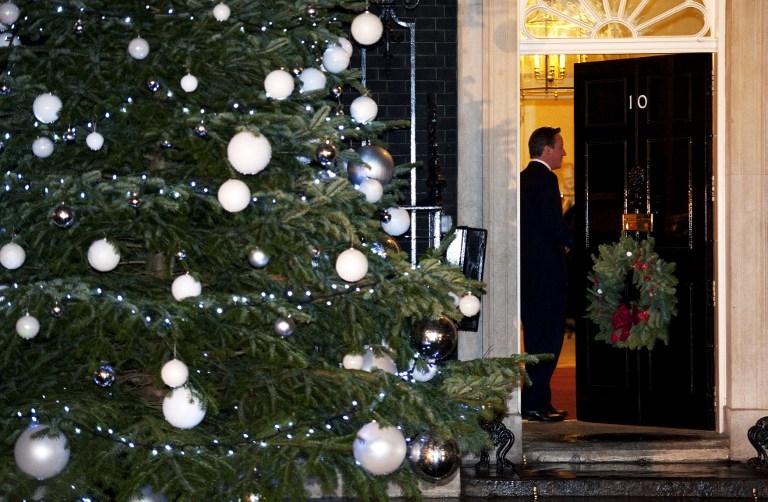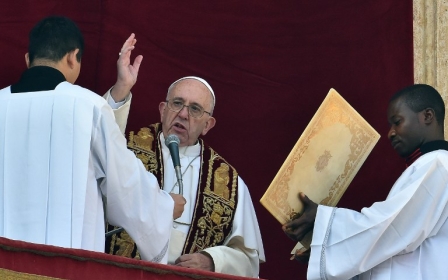Cameron's Christmas message lacks the Christian spirit

When Prime Minister David Cameron became prime minister of Britain five years ago he presented himself as a new kind of national leader. Like US President Barack Obama, Cameron challenged the moral certainties that defined the era of the former American and British leaders George W Bush and Tony Blair. He allowed it to be understood that he had had qualms about the Iraq invasion. He appeared to recognise that the world was a complicated place.
However, there is a new rule in British politics. Whatever position a British prime minister starts out from, he eventually ends up exactly like Blair. David Cameron has come to share the pieties of his predecessor. His Christmas message is a very good example.
"Britain is a Christian country," declared the prime minister. It is certainly true that the Church of England is the state church, and our magnificent Christian inheritance dates back to the arrival of St Augustine 1,500 years ago.
Yet modern Britain is more than a Christian country. Hindus, Jews, Muslims, Buddhists are among the other great religions with substantial populations. Many people define themselves as atheist. To define Britain in terms of Christianity alone sends out an exclusive and sectarian message. This is particularly the case at a time of Islamophobia, anti-Semitism and hostility to immigrants.
Cameron would have been more accurate if he had defined Britain as a tolerant country with an ancient Christian heritage, where all religions get along (as a whole) remarkably well.
The Archbishop of Canterbury’s Christmas sermon was almost as selective. The archbishop concentrated on persecution of Christians, warning that Christianity faces elimination across the Middle East. Once again, to be fair, there is partial truth in the archbishop’s warning.
Christians in the Middle East
The Christian community in Iraq is thought to be the oldest in the world. Before the 2003 invasion it numbered 1.5 million. Today no one is sure. Is it 500,000? Probably even less. We know that a catastrophe has taken place. The Archbishop of Canterbury lays the blame on the Islamic State, and there is no doubt that it has played a hideous role in targeting Christians. According to Louis Sako, the Chaldean Catholic Patriarch of Babylon, there are no Christians left in Mosul, which is now under IS occupation.
Yet the Islamic State is by no means the full story. Though Christians were falling as a percentage of the population before 2003, it is clear that the Blair/Bush invasion 13 years ago was the definitive modern calamity for Iraqi Christians. The archbishop doesn’t mention this.
He doesn’t mention Saudi Arabia, which won’t allow churches on its soil and (indirectly) sponsors the militant jihadi movements, including al-Qaeda, which torment Christians.
He evades all mention of Syria. This is negligent because hundreds of thousands of Christians were killed or fled Syria last year. As the Greek Catholic Patriarch Gregorios III warned: "There is no safe place left in Syria."
But it’s very complicated. If the Archbishop of Canterbury were being honest he would have to accept that the majority of churches in Syria view Assad as their protector. He would also have to accept that Britain and the United States have played a major role in the murderous assault on Syrian Christians. This is because of the Western alliance with regional powers that continue to sponsor or work alongside militant jihadi groups that torment (among others) Christians. I have frequently been asked by Christians during my trips to Syria: "Why are you [Britain] on the side of the terrorists?"
The case of Palestinian Christians is also complicated. There is little evidence that they are being targeted, as the archbishop suggests, by Islamic State (though reportedly local Christians blame "Islamic extremists" for the arson attack on the Mar Charbel monastery in Bethlehem in September).
Christian Palestinians are part of a broader oppression which has nothing to do with Islam. Several years ago Kairos Palestine, an umbrella group for Palestinian Christians, wrote to The Wall Street Journal highlighting the Israeli occupation: "In the case of Bethlehem, for instance, it is in fact the rampant construction of Israeli settlements, the chokehold imposed by the separation wall and the Israeli government's confiscation of Palestinian land that has driven many Christians to leave."
The letter was never published by The Wall Street Journal, perhaps because it expressed an unacceptable truth: there are many reasons why Christians are persecuted and oppressed, and Muslims are often not to blame.
Suffering of Muslims worldwide
As a member of the Anglican Church, I would have preferred my archbishop to say this. He should also have emphasised that there are many areas of the world where Muslims are the ones under attack. Why didn’t he condemn the ugly anti-Muslim rhetoric which has now become commonplace in the United States and is embodied in revolting Donald Trump, leading candidate for the Republican nomination.
In Mindanao in the southern Philippines, the native Muslim population is under constant and shocking assault from Christian militias, backed by a pro-Western government. Rohingya Muslims are being driven out by the state in Burma (Myanmar), which again is backed by the West.
We hear a great deal about Muslim atrocities in West Africa. I remember walking through a Nigerian village where every building (including the mosques) had been destroyed apart from the church, and every Muslim inhabitant massacred.
The following Sunday I made a point of going to communion at that church, and afterwards spoke to the pastor. I asked him where he had been when the massacre happened. He replied that he had run away. I asked him whether Jesus would have approved, and he agreed that he would not have done so.
Words are very important. What people hear matters as much as what leaders say. The outlook for the year ahead is hellish in many places. Many of the problems are caused in part by sectarianism and religious misunderstanding. Certainly some groups that profess allegiance to Islam are to blame. So are groups with Christian and Buddhist allegiance.
The Christmas messages from the British prime minister and the Archbishop of Canterbury should have held out the hope of reconciliation. Instead they have made the prospect for 2016 a little bit nastier.
- Peter Oborne was British Press Awards Columnist of the Year 2013. He recently resigned as chief political columnist of the Daily Telegraph. His books include The Triumph of the Political Class; The Rise of Political Lying;and Why the West is Wrong about Nuclear Iran.
The views expressed in this article belong to the author and do not necessarily reflect the editorial policy of Middle East Eye.
Photo: Britain's Prime Minister David Cameron walks back inside following the official lighting ceremony of the Christmas tree outside the door to his official London residence, Number 10 Downing Street, on 1 December, 2011 (AFP).
New MEE newsletter: Jerusalem Dispatch
Sign up to get the latest insights and analysis on Israel-Palestine, alongside Turkey Unpacked and other MEE newsletters
Middle East Eye delivers independent and unrivalled coverage and analysis of the Middle East, North Africa and beyond. To learn more about republishing this content and the associated fees, please fill out this form. More about MEE can be found here.





